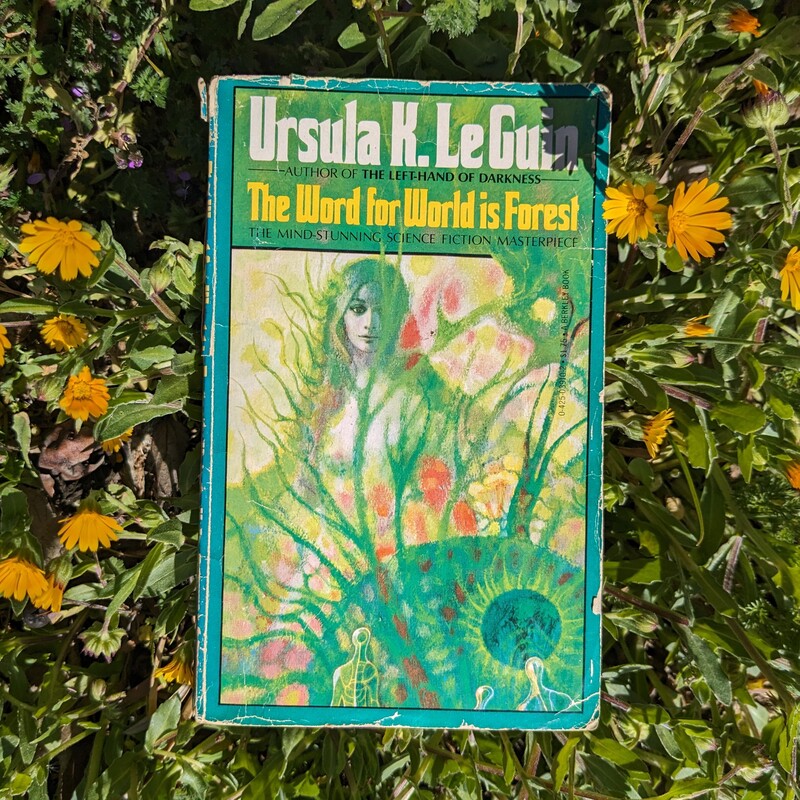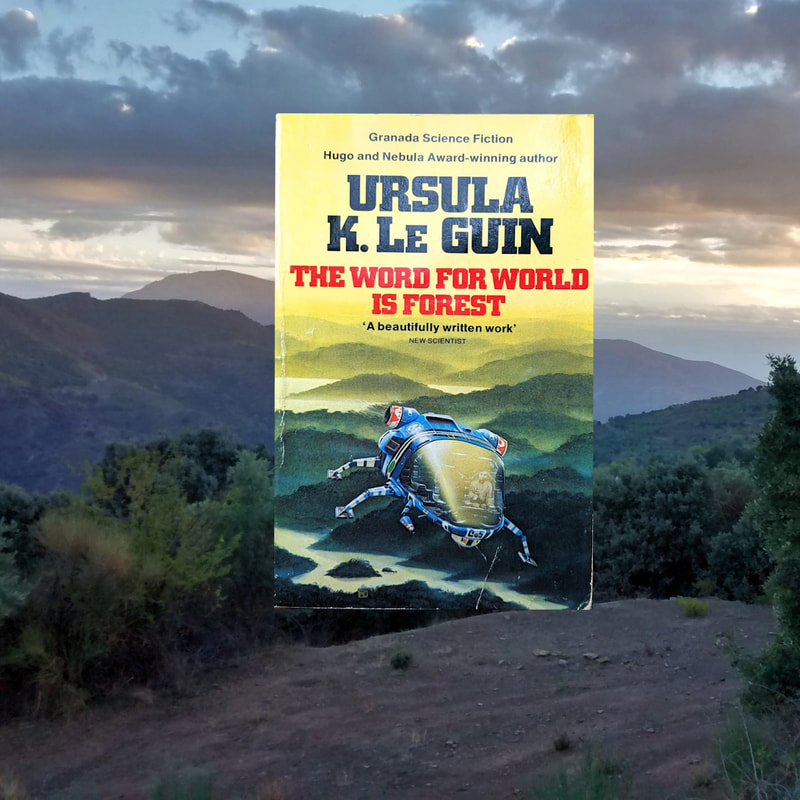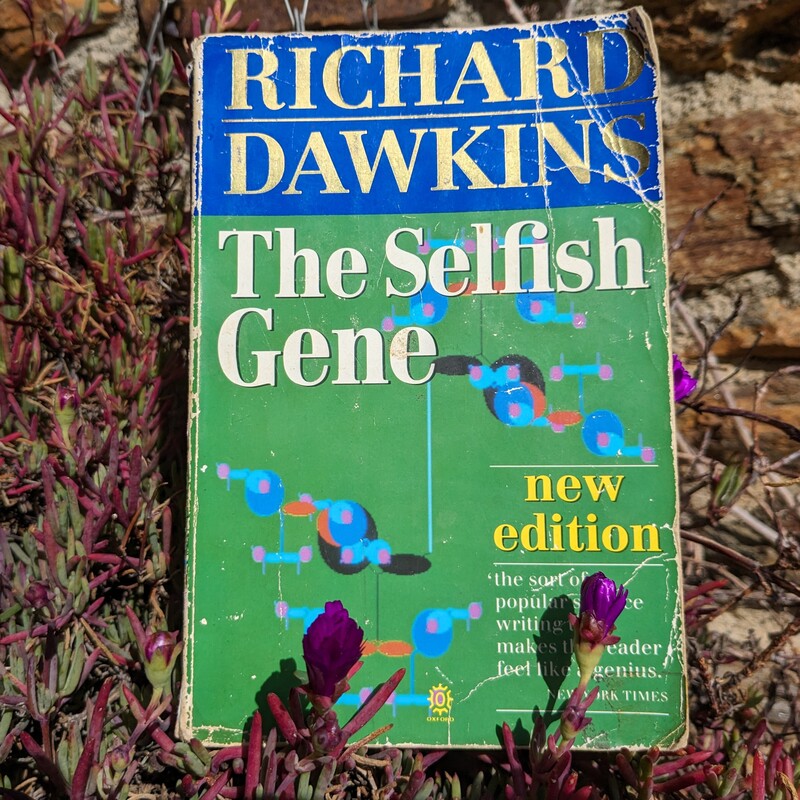|
It starts off sounding just like a regular SF potboiler. Captain Davidson is a space frontiersman twenty-seven light years from home and battling hard to extract raw material to send back to Earth. It’s wood that the planet he’s on has to offer, so he’s cutting down trees and getting them sawn up for lumber as efficiently as he can. It’s a tough job but he’s willing to give it all he’s got. It doesn’t help that cleared forest turns to mud in the rain and their crops are lost in the erosion. They’re short on manpower and all he has a for a factotum is a dumb, slow-moving “creechie,” which is quickly forgotten as Davidson turns his mind to the arrival of a shipload of women—prime breeding stock—and dissension from the scientific team about his methods.
The reader, then, doesn’t pay much heed to the native “creechie”, either. And here is the first instance of Le Guin’s skill. We have taken on board the genre-specific mentality of space-conquering mankind, its superior intellect and physicality, and Davidson’s view of the indigenous species as ignorant and inept. That we come to revise this misconception as the narrative progresses, and go on to fully realize the subtlety and depth of the native Athsheans’ culture and psyche, reflects as well as any story I have read a reassessment and correction of the prevailing view of dominant white western man of the black people that they made slaves, and of the indigenous populations that they robbed and exterminated. Le Guin deliberately makes the Athsheans small, furry beings that our prejudiced homo-sapiens-centric mindset might look down on and consider as lesser-evolved. They will turn out to have a civilization as complex as the forest itself, in and with which they live in tune. In doing so, she presents this race on another planet as people, but not as a version of humans that we might compare and find wanting. Their ethics are as true as any people’s, but their communities work in different ways and they have an interesting, dual, conscious experience of reality that moves between a waking dream state and world time: what we know as normal awareness. Le Guin doesn’t make the mistake of idolizing the Athsheans, which would only be the reverse of the coin of prejudice, but treats them with more respect than that. Introduced to violence, under Selver they appropriate it and pay the “yumens” back. If Davidson’s exploitative, might-is-right mentality points to the fear of the unknown that terrorizes the uneducated, ignorant mind and makes him despise beings that he sees as mere brutes, this same fear is evinced when confronted with minds, again from another race, that operate on yet another plane, but this time his superiors’ superiors. He treats the representatives from the League of Worlds (forerunner of Le Guin’s Ekumen) with what amounts to the same suspicion and hatred. Fear of the other, which includes war on the natural, living home of which we are part, inseparable and interconnected: as always, the interesting science fiction is about the here and now. It also, with the development of the League of Worlds, for example, bears hope for a more enlightened future. As I reread The Word of for World is Forest, Selver’s character brought strongly to my mind the figure of Ishi, last of the Yahi tribe, who, alone and starving, emerged from his native territory in California in 1911 expecting to be killed by the white man. He was eventually befriended by Le Guin’s father, the anthropologist, Alfred Kroeber, studied and looked after, but never again at home. When he was close to death, Ishi was brought “home” to a sunny room in Kroeber’s museum with a view of eucalyptus trees. It doesn’t take much imagination to know how much the man would have wished to die in the true, natural home of his ancestral lands.
0 Comments
“Stick said he wasn’t going if they had to pick up anything.”
First line, Elmore Leonard just dives straight in. He doesn’t try to create an atmosphere: he doesn’t “try to” do anything. He just does it. When I’m not writing, I’m reading all kinds and it can create a jumble in the mind. After reading Leonard, I feel like I’ve just taken all the trash out, swept and mopped and the door’s left open to let the fresh air in. For Stick, robbery was just an option he tried out and he is thinking of working next in construction, maybe. He is not proud or ashamed, having done his time and paid the price, but he has certainly learned valuable lessons in jail. Because he has no agenda or meanness in him, when he applies prison behaviour to Florida life situations outside, the direct fearlessness takes others and us by surprise and the effect is deadpan humorous. Leonard’s a writer I go to to learn from. Like Stick, he does what he does quietly and singularly well. When it comes to writing, he lets others make a song and dance and just gets the job done. There’s more to this than just a preferred style. Leonard’s happens to match his milieu of dodgy business, crime and other ways that his American characters make money and get by. With Leonard, we hear the real voices. These people wouldn’t say, “Is she married?” “Do you cook?” They say, “She married?” “You cook?” If his characters have no use for auxiliaries, or the word “if”, neither does he. As the voices, so the narrative description, also. Not ‘how you would describe this to create an effect?’ but: ‘what does it look like?’ Only Leonard would come out with such supreme advice for writing as this: “leave out the parts people skip.” When you respect words as he does, using them sparingly as an astronaut using water, they grow in power. But there’s more to it that this. Leonard wasn’t aiming for authenticity—if ever you do that, you miss—but it is achieved in his books because he is practicing something else altogether: invisibility. This is the great lesson I take away from reading him. Let the characters and the story take over and keep your own self out of it. While we need the well-informed doom-mongers to help save us from ourselves, there is no shortage of them, and we also need other, similarly knowledgeable scientists to give us a vision of what a successful outcome for humanity and the planet might look like, to give us hope and something to work towards.
His chirpy optimism might irritate a little, but it is good to listen to a Michio Kaku and not just the Eeyores. He goes boldly where other scientists are too defeatist to venture, while always presenting his predictions as potentialities only, grounding them in established fact and with caveats. Written in 1998, some of the breezy technological predictions in “Visions” haven’t seen the light of day, but to dwell on these would be to miss the point, which is to consider the big picture and what the potentialities are. Where my interest really perks up is when he talks about Type I, II & III civilizations as posited by astronomer Nikolai Kardashev, and based on progressive energy consumption. On this cosmic scale, ours is a Type 0 civilization, deriving our energy from dead plants (fossil fuels) and “like a spoiled child unable to control its self-destructive temper tantrums and outbursts. Its immature history is still haunted by the brutal sectarian, fundamentalist, nationalist and racial hatreds of the past millennia.” If a Type 0 civilization doesn’t destroy itself in nuclear war or by over-polluting its planet, it should eventually “unlock the secret of life, artificial intelligence and the atom” with “the biomolecular, computer and quantum revolutions to link all their peoples in a powerful telecommunications and economic network …, the knowledge to cure disease and feed their expanding population … and the power and materials to build a planetary society.” “About 100,000 years ago, soon after modern Homo sapiens emerged in Africa, the Great Diaspora began when these small wandering tribes began to spread out.” As a consequence, we became separated by both culture and race. Kaku sees the current scientific revolutions unleashing forces that will erode the centrifugal tendencies of the Great Diaspora and favour the decline of nations and the building of a planetary culture. Consciousness, the most personal of all mysteries, where we have our being: how it came to be is fascinating to explore. I expect science to arrive at a sound understanding of its origin; meanwhile, we are all in the conversation.
Human consciousness seems to have begun some 200,000 years ago. I don’t know about you, but that seems astonishingly recent to me. I can easily imagine a hundred years ago, perhaps a few hundred more, maybe even a thousand years. I can’t imagine living conditions 200,000 years back, but the time-span is graspable and for there to be have been such a before and after at that point is simply extraordinary. Every other form of life that we know of has evolved from the simple to the complex, so one would expect the development of consciousness to have a physiological history likewise. I am drawn to the image of neurological activity reaching a critical mass, whereupon a slow explosion happens. A multitude of breakthroughs: and the light goes on. It is clearly an ongoing process. We are still evolving. We are only part way along the path and process of awakening. We have just to not commit collective suicide to give human beings perhaps thousands of years from now the chance to exist and have moved on from our conflictiveness. Until we learn how to manage it, thought in particular remains a double-edged sword. Its objective distancing gives us an overwhelming ability to manipulate our environment and advantage over other creatures, but in doing so sets us apart from them, from each other, and from our own selves. In 2008, the magazine I was working for in Buenos Aires invited me to contribute an article on the subject of consciousness. I came up with a very speculative piece called “Social Life” that considers how the very simple can give rise to the interestingly complex, such as the termite mound in the image for this post. You can find it as a “hidden” page on this site here: http://www.guysimpson.com/social-life.html The Selfish Gene – Richard Dawkins
It’s nearly spring at the cottage and time to cut back the tough grass and weeds already. There’s one I find afterwards that I spared because it’s almost indistinguishable from oregano. And I think, “Aren’t you clever, making such a good imitation?” As if the plant had purposefully developed in this way to escape the gardener with his strimmer. I don’t know about you, but I find this tendency to anthropomorphize strongly persuasive. To know that such thinking is mistaken takes away none of the charm of the pathetic fallacy, any more than an understanding of our genetic inheritance takes away the fact of human kindness: it just makes it overwhelmingly interesting. Referring to the theory of evolution, Dawkins’ opening line reads: “Intelligent life on a planet comes of age when it works out the reason for its own existence.” In this book, he takes Darwin’s great idea a huge step further. The unit of selection, he will show, is not the individual (mammal, plant or insect), but the gene. It is not so much that we benefit from a particular configuration of our DNA, but that we are vehicles and reproducers of convenience for its constituent genes. A gene, just as the oregano lookalike, has no agency. It does not want to be replicated, but the ones best adapted to survive and prosper in their environment will do so. The existence of a gene is proof of its success in being replicated: tautologous but accurate. Nothing succeeds like success. We have only to watch a TV documentary to see “Nature, red in tooth and claw,” and if at times selective altruism is practiced, it is only because such behaviour is the optimum survival strategy. Knowing this gives us pause and crucial understanding that can inform our choices. Because interestingly, humanity, with its “unique… capacity for conscious forethought” is not compelled to act out its genetic conditioning. We can even discuss ways of cultivating altruism, “something that no other species has ever aspired to.” How the complexity of consciousness and empathy has come about is not the remit of this book, and I will look at it my next post. |
Blogging good books
Archives
July 2024
Categories |






 RSS Feed
RSS Feed
